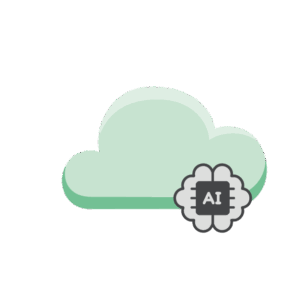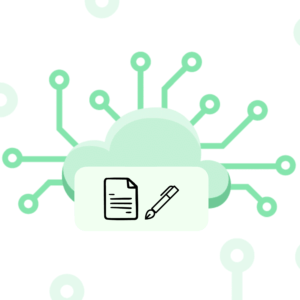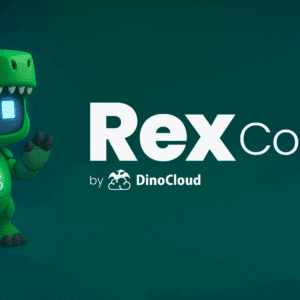
Are you still managing your data the traditional way? Curious about the benefits of cloud-based data solutions? Discover the power of the data cloud and how it can revolutionize your data management and analysis.
In today’s digital age, businesses generate vast amounts of data every day. From customer information and sales data to operational logs and social media interactions, the volume and variety of data can be overwhelming. Traditional methods of data management and analysis struggle to keep up with this increasing complexity.
That’s where the data cloud comes in. A data cloud is an open, cloud-based data infrastructure that provides a comprehensive approach to data management and analysis. By leveraging cloud computing services, organizations can store, manage, and analyze their data efficiently, fostering digital transformation and driving innovation.
But how exactly does the data cloud operate? What are its essential components, and what advantages does it offer? In this article, we will explore the intricacies of the data cloud and its role in data integration, analytics, security, and governance.
Key Takeaways:
- The data cloud is a cloud-based data infrastructure that revolutionizes data management and analysis.
- It offers on-demand compute, storage, delivery, and advanced analytics capabilities.
- Data clouds enable the availability, integration, portability, and security of enterprise data for digital transformation and value creation.
- Cloud-based data solutions provide centralized data management, enhanced security measures, and improved accessibility.
- The data cloud plays a crucial role in data integration, analytics, and ensuring data security and compliance.
Defining the Data Cloud
The data cloud is an open, cloud-based data infrastructure that revolutionizes the way organizations store, manage, and analyze their data. This cutting-edge technology offers a comprehensive approach to cloud computing services, providing enterprises with on-demand compute, storage, delivery, and advanced analytics capabilities.
Essential Components of a Data Cloud
A data cloud comprises several essential components that work in harmony to unlock its full potential. These components include:
- Discoverable data: The data cloud unifies structured, unstructured, or semi-structured data from multiple sources, enabling organizations to gain a holistic view of their information assets.
- Agile data architecture: The data cloud offers flexible storage solutions like data warehouses or data lakes, allowing businesses to adapt to changing data needs and seamlessly scale their infrastructure.
- Built-in AI and machine learning capabilities: With AI and machine learning integrated into the data cloud, organizations can perform advanced analytics, automate processes, and unlock actionable insights from their data.
- Open data platform: The data cloud leverages open data platforms that facilitate seamless data ingestion and management across multi-cloud and hybrid cloud environments, offering flexibility and agility.
- Trusted security foundation: Data security and compliance are of paramount importance in the data cloud. This infrastructure ensures data protection and compliance throughout the data life cycle, safeguarding sensitive information and maintaining trust.
Advantages of an Open Data Infrastructure
One of the key advantages of the data cloud is its open data infrastructure. An open data infrastructure enables:
- Efficient data integration and interoperability across disparate systems and applications, eliminating data silos and fostering collaboration.
- Flexibility and scalability, allowing organizations to adapt to evolving data needs and seamlessly expand their infrastructure.
- Interconnectivity with various cloud computing services, empowering businesses to leverage a diverse range of tools and resources for data analysis and digital innovation.
- Cost-effectiveness by leveraging a shared infrastructure and reducing the need for on-premises hardware and maintenance.
- Rapid innovation and experimentation, enabling organizations to quickly adopt new technologies and stay ahead in the digital race.
Emergence of Data Clouds for Digital Innovation
Data clouds have emerged as catalysts for digital innovation and transformation. Organizations across industries are leveraging cloud-based data solutions to:
- Accelerate data-driven decision-making and gain actionable insights from vast amounts of structured and unstructured data.
- Break down data silos and create a unified view of enterprise information, enabling seamless data integration and collaboration.
- Enhance operational efficiency, streamline processes, and drive productivity through automation and advanced analytics.
- Enable real-time data processing and analysis, empowering businesses to make rapid, data-driven decisions.
- Unlock the power of AI and machine learning, harnessing the potential of predictive analytics and intelligent automation.
By embracing cloud-based data solutions, organizations can leverage the transformative capabilities of data clouds and drive innovation, growth, and success in the digital era.
The Integral Features of Cloud-Based Data Solutions
Cloud-based data solutions offer integral features that enable organizations to optimize their data management and analytics processes. These solutions provide centralized management of data infrastructure, allowing organizations to collect, process, store, and analyze data from a single unified platform.
One of the key advantages of cloud-based data solutions is their support for greater mobility. Employees can securely access data from anywhere in the world, enabling remote work and collaboration. This flexibility enhances productivity and efficiency, as teams can access and work with data in real-time without being tied to a specific location.
Cloud-based data solutions also enhance performance by efficiently exchanging data between different cloud storage systems. They enable seamless data integration, facilitating the flow of information across multiple platforms and applications. This integration capability is crucial in today’s data-driven world, where businesses rely on the seamless exchange of data to fuel their operations and make informed decisions.
Furthermore, cloud-based data solutions support various types of business data, including structured, semi-structured, and unstructured data. This versatility allows organizations to leverage different data sources and types for comprehensive data analysis. By harnessing the power of diverse data, businesses can gain valuable insights and drive data-driven decision-making.
Security is a top priority for organizations when it comes to data management. Cloud-based data solutions offer enhanced security measures to protect sensitive data in a cloud environment. These solutions implement robust encryption, access controls, and data protection mechanisms to ensure the confidentiality, integrity, and availability of data.
Another important feature of cloud-based data solutions is the ability to break down data silos and provide a single source of truth for the entire organization. By unifying data from different sources and ensuring its accuracy and consistency, organizations can improve data accessibility and enable more informed decision-making. Data silos can hinder collaboration and create inefficiencies, but cloud-based solutions mitigate these challenges by centralizing data management.
In summary, cloud-based data solutions offer integral features to optimize data management and analytics processes. They enable organizations to collect, store, and analyze data from a unified platform, support mobility and data integration, enhance data security, and break down data silos. By leveraging these features, organizations can unlock the full potential of their data, drive innovation, and gain a competitive edge.
Role of Data Cloud in Data Integration and Analytics
The data cloud plays a crucial role in data integration and analytics, empowering organizations to unlock the full potential of their data. By leveraging the capabilities of the data cloud, businesses can streamline their data management processes and derive valuable insights for informed decision-making.
Data Warehousing and Lakes in Data Clouds
Data warehousing provides a structured approach to data storage, organizing information in a way that facilitates complex data queries and analysis. It serves as a centralized repository for structured data, allowing organizations to store and access their data in a structured format for reporting and business intelligence purposes.
On the other hand, data lakes store raw data in its original format, providing a flexible and scalable solution for data storage and processing. This allows organizations to capture and store massive amounts of data without predefined schemas, making it easier to accommodate diverse data types and formats. Data lakes support exploratory and ad hoc analytics, enabling organizations to perform data analysis on-the-fly without the need for extensive data transformations.
Real-Time Data Processing and Analysis
The data cloud facilitates real-time data processing and analysis, enabling organizations to derive insights and make informed decisions in a timely manner. By leveraging real-time analytics capabilities, businesses can monitor data streams, detect patterns, and respond swiftly to emerging trends or anomalies.
Real-time data processing allows for immediate analysis and action, enabling organizations to capitalize on time-sensitive opportunities and address potential issues promptly. It enables businesses to harness the power of real-time data for applications such as fraud detection, predictive maintenance, and personalized customer experiences.
AI-Driven Insights and Machine Learning
The data cloud leverages AI-driven insights and machine learning to extract valuable information and patterns from vast and complex datasets. By applying advanced analytics techniques, organizations can uncover hidden correlations and trends, automate processes, and make data-driven predictions.
AI-driven insights enable businesses to gain a deeper understanding of their data and make more accurate predictions and recommendations. Machine learning algorithms can automatically analyze and learn from data, allowing organizations to enhance their decision-making processes and drive innovation.
| Data Cloud Capabilities | Benefits |
|---|---|
| Data Integration | – Seamlessly integrate data from multiple sources – Reduce data silos and achieve a unified view of information – Improve data consistency and accuracy |
| Data Analytics | – Derive actionable insights from data – Enable data-driven decision-making – Identify patterns and trends |
| Real-Time Data Processing | – Timely detection of emerging trends or anomalies – Faster response to critical events or opportunities – Real-time monitoring and performance optimization |
| AI-Driven Insights | – Identify hidden correlations and relationships – Automate processes and optimize efficiency – Enhance predictive capabilities |
| Machine Learning | – Continuously learn from data and improve accuracy – Enable intelligent automation and predictions – Drive innovation and competitive advantage |
Ensuring Data Security and Governance in the Cloud
When it comes to leveraging data clouds, data security and governance should be top priorities for organizations. The protection of data throughout its life cycle, from collection to deletion, requires careful implementation of various measures to prevent unauthorized access or data breaches.
Data Protection Throughout the Data Life Cycle
One crucial aspect of data security in the cloud is implementing encryption. By encrypting data at rest and in transit, organizations can ensure that even if it is intercepted, it remains unreadable to unauthorized individuals. Access controls play a significant role in data protection by limiting who can access and modify sensitive information, reducing the risk of unauthorized data manipulation or leakage.
Auditing is another critical component of data governance in the cloud. By keeping track of data access and activities, organizations can monitor and detect any suspicious or unauthorized behavior. Regular audits help ensure compliance with internal policies, regulatory requirements, and industry standards.
Compliance and Recovery Mechanisms
Data clouds provide compliance mechanisms to help organizations meet regulatory requirements and industry standards. By implementing data governance policies and procedures, businesses can ensure that their use of cloud data platforms aligns with data protection laws, privacy regulations, and industry best practices.
In the event of unforeseen circumstances or data loss, recovery mechanisms in data clouds play a crucial role. By implementing data backup and recovery strategies, organizations can minimize the impact of data loss and quickly restore critical information to ensure uninterrupted business operations.
Conclusion
In conclusion, data clouds offer an efficient and secure infrastructure for organizations to store, manage, and analyze their data in the cloud. These cloud-based data solutions provide a comprehensive approach to data management, integration, analytics, and security, enabling businesses to optimize their operations and achieve digital transformation.
Data clouds play a crucial role in driving innovation and maximizing business outcomes. By leveraging the features and advantages of data clouds, organizations can unlock the full potential of their data. They can gain valuable insights, make data-driven decisions, and accelerate their journey towards success in the digital era.
With data clouds, businesses can streamline their data management processes, ensuring the availability, integration, and secure storage of their data. They can harness the power of advanced analytics and machine learning to extract actionable insights from their data, fueling innovation and driving competitive advantage. Furthermore, data clouds provide a trusted security foundation, protecting data throughout its lifecycle and ensuring compliance with industry regulations.
Discover how AWS Cloud Computing can revolutionize your data management and analysis by reading our detailed exploration here.
FAQ
What is a data cloud and how does it operate?
A data cloud is an open, cloud-based data infrastructure that allows organizations to store, manage, and analyze their data efficiently. It provides on-demand compute, storage, delivery, and advanced analytics capabilities. The data cloud enables the availability, integration, portability, and security of enterprise data, driving digital transformation and value creation for businesses.
What are the essential components of a data cloud?
The essential components of a data cloud include discoverable data, an agile data architecture, built-in AI and machine learning capabilities, an open data platform, and a trusted security foundation. These components help in unifying data from multiple sources, providing flexible storage solutions, enabling advanced analytics and automation, orchestrating data ingestion and management across multi-cloud and hybrid cloud environments, and ensuring data protection and compliance throughout the data lifecycle.
How do data clouds contribute to digital innovation?
Data clouds play a crucial role in digital innovation by providing an efficient and secure infrastructure for storing, managing, and analyzing data in the cloud. They offer cloud-based data solutions and enable organizations to optimize data management, integration, analytics, and security. By leveraging the features and advantages of data clouds, businesses can unlock the full potential of their data and accelerate their journey towards success in the digital era.
What are the integral features of cloud-based data solutions?
Cloud-based data solutions offer integral features such as centralized management of data infrastructure, mobility for accessing data securely from anywhere, enhanced performance through efficient data exchange between different cloud storage systems, enhanced security measures for protecting sensitive data, and breaking down data silos to provide a single source of truth for the entire organization.
How does a data cloud ensure data security and governance?
Data clouds ensure data security and governance by implementing measures such as encryption, access controls, and auditing to prevent unauthorized access or data breaches. They also provide compliance mechanisms to meet regulatory requirements and industry standards, ensuring data privacy and protection.
LinkedIn: https://www.linkedin.com/company/dinocloud
Twitter: https://twitter.com/dinocloud_
Instagram: @dinocloud_
Youtube: https://www.youtube.com/c/DinoCloudConsulting



